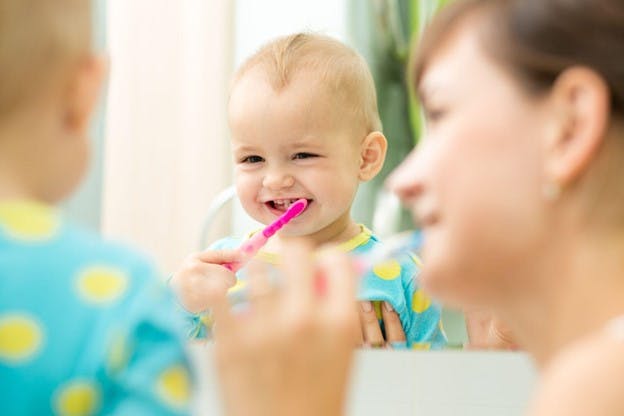September 2023
Should I Use Filtered Water in My Baby Formula?
If you're a new parent, you've probably wondered, "Should I use filtered water in my baby formula?" Here's what you need to know before you fill their bottle.
You want to keep your kids safe and healthy, especially when they are too little to fend for themselves. If you have a baby at home or on the way, you’ve probably thought about everything from the softness of their blanket to the ingredients in their shampoos and lotions. You’ve spent time researching every product that’s come into your home and tried to only choose the best.
But what about your water? With more and more people in the U.S. buying water filters each year to protect their families from known and unknown contaminants, you may be wondering if tap water is good enough for your baby. And if it’s not, what water should you use for things like bathing them and mixing formula?
In this article, we’re going to look at tap water through the lens of a concerned parent and answer the question: “Should I use filtered water in my baby formula?”
Should I Use Filtered Water in My Baby Formula or Bottled Water?
Bottled water companies spend huge sums of cash to make their product seem premium to tap water. Here’s a secret, though: Tap water and bottled water have almost identical safety regulations. The only difference is tap water is regulated by the United States Environmental Protection Agency (EPA), while bottled water is regulated by the Food and Drug Administration (FDA).
The goal of the FDA is to make sure bottled water holds to the same standards as tap water. Because of that, the regulations virtually mirror each other. When the EPA makes a change to tap water regulations, the FDA changes bottled water rules to match it, if deemed necessary.
So, if you’re buying bottled water to avoid tap water contaminants, you should know that you’re not only getting the same quality of water, but you’re paying up to 2,000 times more for what you’d get from your tap.
How Safe Is Tap Water for Baby Formula?
If you get drinking water from a public utility, that water is likely to be considered safe to drink by the U.S. EPA and any state health department that governs water quality. Safe means the concentration of 90 different regulated contaminants is below legally allowed levels.
If we look deeper, though, there are some problems with this:
- There are millions of unregulated contaminants. Most of which aren’t well understood or tested for.
- Regulations are tailored for the general population, which typically consists of healthy individuals. What is safe for most people may not be safe for the very young, the very old, pregnant women, and those with compromised immune systems.
- Regulations can be outdated. There hasn’t been a change to water regulations by the EPA or the FDA in about 20 years.
There are several impurities in tap water that can cause problems in the development of small children, including fluoride and lead.
Can I Use Fluoridated Tap Water in My Baby Formula?
Most public water supplies in the United States and Canada are fluoridated. Fluoride is meant to help prevent tooth decay. While many consider fluoridated tap water to be an important public health advancement, it hasn’t been without controversy.
One of the reasons is something called dental fluorosis. This is a dental condition where too much fluoride can turn teeth brown or cause white lines and streaks to run across them. In places where heavy exposure to fluoride is a concern, the problem can extend to having brittle bones and impaired mental development.
Given the small amounts of fluoride added to tap water, these problems aren’t common. However, due to the size of infants and the fact that powdered formula often already has a low fluoride level in it, dental fluorosis is more likely when fluoridated water is regularly used in formula preparation.
The U.S. Centers for Disease Control and Prevention (CDC) and the American Academy of Pediatrics recommend breastfeeding when possible due to the natural antibodies found in breast milk. If breastfeeding isn't possible, you should talk to your pediatrician to find the best brand of infant formula and limit exposure to fluoridated water to lower the chances of dental fluorosis. You can use ready-to-feed formula if you don’t have access to safe water.
To know if your water is fluoridated, check with your water supplier. If fluoride is added to your water source, you can remove it using a reverse osmosis water filter. Purification methods like boiling water and standard activated carbon filters, like those found in water filter pitchers, won’t remove fluoride.
Should I Be Worried About Lead in My Tap Water for Baby Formula?
Lead can occur in tap water from natural sources, or it can leach into water from old plumbing. Lead was commonly used in water service lines and home plumbing prior to 1986, and millions of those pipes have not been replaced yet.
When it comes to children and pregnant women, there is no safe level of lead in their blood. Lead is considered a neurotoxin, and even a small amount can cause permanent brain and nervous system damage in children.
The good news is that due to the severity of the issues lead can cause, it has been taken very seriously by regulators. If lead pipes are still in service in city-owned water lines, they are usually coated to limit copper and lead leaching into the water.
As we’ve seen in recent years, though — with the water crisis in Flint, Michigan and other areas — these regulations don’t always fully protect us. Furthermore, if lead is present in your home plumbing, it’s considered the homeowner's responsibility to fix.
If you believe you could have lead in your plumbing, or if you have unregulated well water, it is recommended that you test your tap water for lead. If you do have lead in your drinking water, it can be filtered out with an under-sink water filter. Just be sure the filter you use is rated to remove lead, since many are not.
Is It OK to Use Water That Has Nitrates for Baby Formula?
Nitrates are used in fertilizers. Due to storm water runoff, they can easily find their way into the water systems that provide our drinking water.
Nitrate consumption can lessen our red blood cells' ability to carry oxygen. In infants, this can lead to a condition called infant methemoglobinemia, or blue baby syndrome. While rare, this can be dangerous and should be treated immediately.
Nitrates are regulated if you have city water, but if you have a private well, you’ll need to test for nitrates on your own. If nitrate levels are above 10 milligrams per liter (mg/L), pregnant women and breastfeeding mothers should also avoid drinking the water.
Blue baby syndrome can be brought on by nitrate-rich foods as well as certain medications and chemicals found in drinking water, like benzocaine and aniline.
Is It OK to Use Filtered Water in Baby Formula?
In general, it is encouraged to use filtered water in baby formula. But keep in mind that filtered water, which is sometimes called purified water, isn't really a type of water. These terms simply indicate that the water has passed through some type of filtration system.
Not all filters or filtration methods are equal, though. For instance, many popular filters don’t remove lead and fluoride.
Is It Good to Use Distilled Water for Formula?
Water distillation is a process that involves boiling water and capturing the steam. When the steam rises, it leaves the contaminants behind, so you end up with very clean water. The distillation process even removes fluoride.
While it's fine to use distilled water to prepare formula occasionally, it’s not the best choice for regular use. Distillation removes contaminants from water, but it also removes beneficial minerals and electrolytes.
What Is the Safest Water to Use with Formula?
The safest and best water to use with formula is tap water that’s been filtered using reverse osmosis. Reverse osmosis removes fluoride, lead, nitrates, and a host of other contaminants from water. It’s also cheaper than bottled water, more accessible than distilled water, and can be a simple addition to your home with a water filter you can install right under your counter.
Should I Boil Tap Water for Baby Formula?
You shouldn’t always need to boil your water for baby formula, but there are times when it’s a good idea. Here are some cases when you should boil water for baby formula:
- The manufacturer calls for it. Always follow directions on the package when preparing baby formula.
- Your baby is under two months of age, was born prematurely, or has a compromised immune system. Consult your healthcare provider if any of these are true.
- Your water is unsafe, and/or there’s a boil water advisory issued in your area.
Some formula manufacturers recommend boiling water before mixing it with tap water.
Water Filtration Benefits the Whole Family
Using filtered water in baby formula can help to reduce or eliminate potentially dangerous contaminants like fluoride, nitrates, and lead. Filtered water, especially water that’s gone through reverse osmosis filtration, is the safest water you can mix with your baby’s formula. Using reverse-osmosis-filtered water, you won’t have to worry about dental fluorosis, lead, or nitrates when feeding your little one.
And filtered water isn’t just good for your baby — the whole family can enjoy clean, great-tasting water with a home water filter. A water filter improves the taste and smell of your water by reducing chlorine, rust, heavy metals, bacteria, and more. The HomeWater 4-Stage Reverse Osmosis Under Counter Water Filter system is a convenient and effective way to bring purified water into your home. You’ll notice the HomeWater difference in the first sip.

